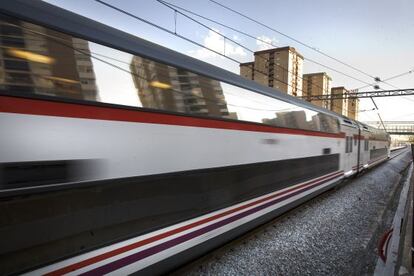Driven to distraction by the decibels
The Ombudswoman is calling on the government to tackle excessive plane, train and road noise The problem can cause major health issues, but agencies say there are no funds to deal with it

Whistles, sirens, doors banging open and shut, explosions, buzzing… Constant noise can completely alter the lives of those who have to put up with it, and the side effects go beyond frayed nerves, anxiety and insomnia.
A CIA report included relentless noise as a torture method that leaves no physical marks but has devastating effects on the mind. The US intelligence services has permitted loud sounds to be blared uninterruptedly in prison cells for up to 72 hours, making sleep impossible. Those who have suffered from constant noise describe it as endless torture.
A 2013 report by Spain’s Ombudswoman, Soledad Becerril, focuses on the racket created by the likes of railroads, highways and airports, which generate precisely the kind of noise that the World Health Organization (WHO) links to conditions ranging from heart attacks to learning difficulties and tinnitus.
The WHO sets the limit at 65 decibels, equivalent to the sound of a vacuum cleaner. But when that barrier is exceeded, there are no immediate solutions despite existing legislation at the national and local levels. In fact, people who are subjected to noise pollution typically have to suffer for years after running into a wall of silence from authorities.
“There comes a point when you no longer hope for the noise to go away, but simply for it not to keep growing”
“Government agencies generally dismiss or ignore complaints,” explains Agustín Bocos, president of an advocacy group called Juristas Contra el Ruido (Jurists Against Noise).“There is no choice but to resort to the courts, which take on average a year to hand down the first ruling, and another year to deal with an appeal in a higher court.”
These are some of the cases that the Ombudswoman features in her 2013 report:
» Roads. Noise pollution along the Costa del Sol Highway, particularly around the Marbella bypass, continues 15 years after construction work began on a spot near a residential area. In all this time, no measures have been taken to reduce the impact of the noise by the legal deadlines. The report mentions similar cases on the A-38 freeway near Sueca (Valencia) and along the SE-30 road in Seville, where residents have been complaining for the last decade. Authorities like to pin the blame on a lack of available funds for carrying out changes, but Becerril feels that this argument is “canceled out” by the fact that in many cases the problem began during the boom years.
» Airplanes. Air traffic has fallen below 2004 levels, but the complaints keep coming in from places such as Palma de Mallorca and Alicante airports. Mallorca has had a Noise Isolation Plan in place since 2005, and so far 710 out of 737 affected homes have been soundproofed, according to the AENA airport authority. In Alicante, soundproofing began in 2003 and in 2010 the project was expanded to include more houses. So far, 1,846 out of 1,914 homes have been protected from the din overhead. “There comes a point when you no longer hope for the noise to go away, but simply for it not to keep growing,” says Mari Ángeles López Lax, a lawyer specializing in environmental issues who was personally affected by the change in air traffic routes at the Madrid airport in 1998. López Lax is a veteran of this kind of lawsuit.
“In order to get to the courts, we had to find expert technicians in the Netherlands, because in Spain they all work for AENA,” she says. Even though meetings with big corporations often end up in little more than “nice words,” López Lax, who is the founder of the National Association of People Affected by Air Traffic, defends the need to keep up social pressure.
» Trains. Becerril notes the precision with which residents of Bellvitge (Valencia) are able to describe the types of train engine that roar by. They also complain about the noise at night, when workers clean the station. Adif, the railroad infrastructure manager, says no compressors, generators or other mechanical devices are used at night, but does admit that the tracks get cleaned up at this time because “it cannot be done at any other time without interrupting train services.”
Tu suscripción se está usando en otro dispositivo
¿Quieres añadir otro usuario a tu suscripción?
Si continúas leyendo en este dispositivo, no se podrá leer en el otro.
FlechaTu suscripción se está usando en otro dispositivo y solo puedes acceder a EL PAÍS desde un dispositivo a la vez.
Si quieres compartir tu cuenta, cambia tu suscripción a la modalidad Premium, así podrás añadir otro usuario. Cada uno accederá con su propia cuenta de email, lo que os permitirá personalizar vuestra experiencia en EL PAÍS.
¿Tienes una suscripción de empresa? Accede aquí para contratar más cuentas.
En el caso de no saber quién está usando tu cuenta, te recomendamos cambiar tu contraseña aquí.
Si decides continuar compartiendo tu cuenta, este mensaje se mostrará en tu dispositivo y en el de la otra persona que está usando tu cuenta de forma indefinida, afectando a tu experiencia de lectura. Puedes consultar aquí los términos y condiciones de la suscripción digital.









































